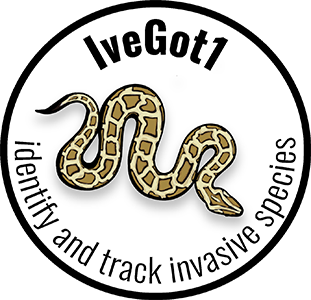How You Can Help
The Everglades CISMA needs YOU to help control invasive plants and animals in South Florida. There are many ways to get involved.
Don’t Let It Loose!
Burmese pythons, tegu lizards, lionfish, and many other invasive animals were introduced to South Florida through the pet trade. You can help prevent more invasions by being a responsible pet owner. NEVER let an exotic pet loose into the wild.
- Do your research before buying an exotic pet. Make sure you understand how long it will live, how big it will get, what care it needs, and if it is a safe pet for your household. Read more in the Buyer’s Guide to Pet Reptiles.
- If you can no longer care for your exotic pet, surrender it at one of FWC’s Exotic Pet Amnesty Day events. You will not be penalized and the animal will be placed in the care of a pre-approved adopter.
- Can’t wait until the next Amnesty Day event? Call the Pet Amnesty hotline at 1-888-IVE-GOT1 and they will help find a home for your exotic pet.
- If you are an experienced exotic pet owner, you can provide a home for surrendered pets through FWC’s Exotic Pet Amnesty Program. Adopters must apply and be approved before adopting an animal at an Exotic Pet Amnesty Day event.
- Learn about regulations and permitting requirements for certain exotic pets at FWC’s website.
- Never release aquarium fish or plants into Florida’s water bodies.


Report Invaders!
After an invasive species has been introduced, early detection and rapid response (EDRR) is the best tool we have to remove invaders before they cause problems. Public reports can help us detect new invaders and better understand the abundance and locations of established invasive species.
- Learn how to identify nonnative animals and plants so you can tell them apart from native Florida species. The Everglades CISMA offers many identification tools on our Publications & Tools page.
- Download the “IveGot1” app for iPhone or Android so you can identify and report invaders wherever you go.
- Report invasive species by calling 1-888-IVE-GOT1 or online at www.IveGot1.org
- Take the Introduced Reptile Early Detection and Documentation (REDDy) online training course to learn how to recognize and report large, invasive reptiles.
- Join the Python Patrol! This training program teaches people how to identify Burmese pythons, capture them safely and humanely, and properly report the data to FWC. Visit FWC’s website to find out about upcoming workshops.
Remove Weeds!
Many invasive plants are popular landscape species that grow and spread aggressively. When they escape into natural areas, they can smother native plants, change wildlife habitats, and make fires more likely. Even in your own yard, these plants can crowd out other species and be very hard to remove once they establish themselves.
- Learn how to identify invasive plants and remove them from your yard. The Everglades CISMA offers many identification tools on our Publications & Tools page and at fleppc.org.
- Dispose of weeds through your community’s yard waste collection program. Never dump yard waste onto public lands!
- Landscape with native plants. Not only are they non-invasive; but they also require less water and care, and they often attract wildlife. Learn how at FloridaYards.org.
- Volunteer to remove invasive plants from natural areas. The Miami-Dade County Environmentally Endangered Lands (EEL) Program organizes volunteer workdays to help protect and restore natural areas. No experience is needed and community hours are available.


Go Fishing!
The Everglades is home to at least 22 species of nonnative freshwater fish, whose impact on native fish communities is yet unknown. Meanwhile, invasive lionfish have the potential to reduce saltwater fish populations and affect Florida’s recreational and commercial fishing industries. The Everglades CISMA encourages anglers to target these nonnative species for consumption.
- Take part in the Everglades CISMA’s annual Nonnative Fish Roundup!
- Go fishing year-round for nonnative freshwater species. Visit MyFWC.com/fishing to learn about Florida’s fishing regulations.
- When you SCUBA dive or skin dive, remove lionfish whenever possible and consider participating in a lionfish derby or tournament. A recreational fishing license is not required to remove lionfish using most types of equipment. Visit FWC’s website to learn more about upcoming events and safe handling practices.
- Inspect boating and fishing equipment after coming out of the water, and remove any “hitchhiking” plants or animals. Learn how at https://www.fws.gov/initiative/fishing/protect-your-waters.
Support the Everglades CISMA!
Help support our work by making a tax-exempt donation to Friends of Everglades CISMA, Inc. Thank you for your support!






